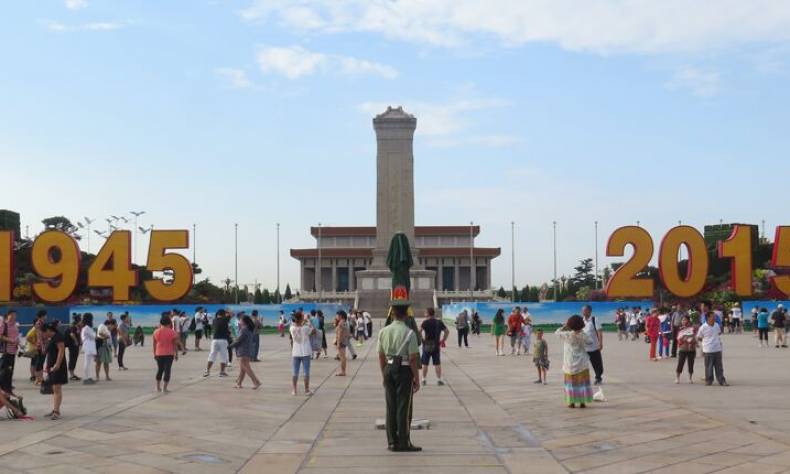
All Eyes on China’s Military Parade
Rio Carnivale? Forget it! Mardi Gras in New Orleans? No thanks! Oktoberfest? No way,Jose!
Yeah, that’s right! The only festival that anybody who is anybody has got on their lips is of course Beijing’s V-day celebrations. (Now, how do you say, ‘duh’ in Mandarin?)
In order to rejoice the 70 year anniversary of China’s victory of “Chinese People’s War of Resistance against Japanese Aggression and the World Anti-Fascist War,” China is introducing a three-day national holiday and throwing together a parade on September 3rd . Xinhua News Agency (the official press agency of the CPC) claims that “the scale and scope of the event are attracting attention from around the world.”
In order to ensure the smooth proceedings of the V-day festivities, the Chinese authorities are leaving no stone unturned and have introduced strict measures. Not only have certain Beijing subway lines and its two airports been temporarily shut, but so have some of the city’s roads and also the Shanghai and Shenzhen stock markets. Individuals near the parade route are even being advised to carry ID at all times. Most amusingly, the authorities have even gone so far as train monkeys to climb up trees and ruin birds’ nests in attempt to rule out any ‘fowl’ play ( danger to jets caused by flying birds).
In an endeavor to keep Beijing’s notorious smog a bay, traffic restrictions have been introduced, and coal-burning plants will halt their activity. Thus, netizens have coined the term ‘military parade blue’ to describe the spectacular azure heavens.
In truth, several Beijingers have bemoaned the heavy and awkward nature of the restrictions. “They look like a bunch of smurfs” my friend laughs, mocking the event’s army of blue t-shirt clad 850,000 volunteers. Similarly, the LA Times also underlined cynical Weibo netizens, including one who commented that “I recommend that the whole country get a seven-day vacation — only that would truly express our patriotism.”
According to Xinhua, the special event “highlights the common aspiration of mankind, among them many Japanese: peace”. This noble message shall aptly be reinforced by organising a military parade which will see an impressive 12,000 soldiers and 500 pieces of artillery strut their stuff through Tiananmen Square. If that is not exciting enough, the authorities have also announced that 84% of the weapons will make their maiden debut in public.
The parade will also boast foreign troops from over ten countries including Russia and Kazakhstan,
and be attended by prominent world leaders including Russian President Vladimir Putin and UN Secretary General Ban Ki-moon.
Needless to say, with every epic party, come party poopers. China’s V-day parade will be no exception. Not only will Japanese Prime Minister Shinzo Abe not attend the event, but the figure heads of many countries – that had actually allied with China in the fight against Nazi Germany and Japan – have also
turned down their invitations. It is believed that US President Obama, German Chancellor Merkel and UK Prime Minister David Cameron have decided to skip the event due to concerns over parade’s supposed jingoistic and anti-Japanese nature. Hence, Evan Madeiros, the White House’s Chief Asia advisor, expressed the USA’s hope that its allies attend to history “in a very constructive, forthright way, to
be honest, but also to promote healing and look to the future.”
Indeed, some may question the logic of promoting harmonious sentiments by brandishing armaments. Qiao Liang, from China’s National Defense University, attempts to justify this concept, putting forth that “There is nothing wrong with flexing our muscles as long as we do it for the right reasons, for instance, self defense (sic) and peace.”
Over the past months, it has certainly been hard to miss negative headlines about Japan in China’s national news. Similarly, there has been a relentless wave of outlandish anti-Japanese shows on Chinese television. Wacky storylines include a Chinese fighter tearing a Japanese soldier in half with his bare hands, whilst another presents a Japanese fighter plane burst into flames in the sky after a Chinese communist – on the ground – hurls a grenade at it. Despite all this, China’s vice minister of Ministry of Foreign Affairs, Zhang Ming, insists that “The celebrations are not targeting Japan, nor the Japanese people.”
In the end, just as Xinhua predicts, the world’s eyes will indeed be on China’s military parade. But what
is less clear is whether the global spotlight will cast a flattering depiction.
 Facebook
Facebook
 Twitter
Twitter
 Linkedin
Linkedin
 Google +
Google +











Comments are closed.